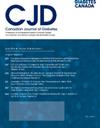圆洞里的方钉:2024年加拿大糖尿病患者的社会生活经验。
IF 2.3
4区 医学
Q3 ENDOCRINOLOGY & METABOLISM
引用次数: 0
摘要
糖尿病自我管理经常发生在社会环境中,周围有其他没有糖尿病的人。国际共识指出,社会对糖尿病患者普遍存在歧视,对健康、福祉、社会和职业生活产生负面影响。我们的目的是确定加拿大成人1型(T2D)或2型(T2D)糖尿病患者的社会经历。方法:对1799名成年糖尿病患者(T1D=786, T2D =1013)进行在线调查。该调查评估了糖尿病的污名、情绪健康、糖尿病困扰、生活质量和医疗保健经历。分析包括对病耻感经历的描述以及与其他措施的关联。结果:因患糖尿病而受到指责和评判的患者较多。对于T1D来说,73%的人表示人们对他们的能力做出了不公平的假设,69%的人表示人们会根据他们的饮食来评判他们。对于T2D, 41%的人报告被诬蔑为患有“生活方式疾病”,31%的人报告因他们的食物选择而受到评判。因糖尿病而被区别对待是很常见的:54%的T1D患者报告被拒绝;22%的T2D患者报告被当作疾病治疗。许多T1D患者担心在公共场合管理糖尿病(44.2%),许多T2D患者对自己患有糖尿病感到尴尬(27.4%)。更大的污名化与更低的总体情绪幸福感、更大的糖尿病困扰以及对生活质量的更大负面影响有关。结论:患有T1D或T2D的成年人通常会经历耻辱,对健康和生活质量产生负面影响。这些数据支持改变关于糖尿病的对话,为加拿大所有糖尿病患者提供更多的尊重、同情和支持。本文章由计算机程序翻译,如有差异,请以英文原文为准。
A Square Peg in a Round Hole: Social Experiences of Living With Diabetes in Canada in 2024
Objectives
Diabetes self-management often occurs in social contexts, around others without diabetes. International consensus identifies the pervasive presence of social stigma toward those with diabetes, negatively impacting health, well-being, and social and professional lives. In this study, we aimed to identify the social experiences of Canadian adults living with type 1 diabetes (T1D) or type 2 diabetes (T2D).
Methods
An online survey was completed by 1,799 adults with diabetes (T1D: n=786; T2D: n=1,013). The survey assessed diabetes stigma, emotional well-being, diabetes distress, quality of life, and health-care experiences. Analyses involved descriptives of stigma experiences and associations with other measures.
Results
Experiencing blame and judgment for having diabetes was common. For T1D, 73% of respondents reported people making unfair assumptions about their capabilities, and 69% reported being judged for what they eat. For T2D, 41% reported being stigmatized as having a “lifestyle disease,” and 31% reported being judged for their food choices. Being treated differently due to diabetes was common: 54% with T1D reported being rejected, and 22% with T2D reported being treated as sick. Many respondents with T1D were concerned about managing diabetes in public (44.2%) and many with T2D were embarrassed about having diabetes (27.4%). Greater stigmatization was associated with lower general emotional well-being, greater diabetes distress, and greater negative impact on quality of life.
Conclusions
Adults with T1D or T2D commonly experience stigmatization, negatively impacting well-being and quality of life. These data support changing the conversation about diabetes in ways that will lead to greater respect, empathy, and support for all people living with diabetes in Canada.
求助全文
通过发布文献求助,成功后即可免费获取论文全文。
去求助
来源期刊

Canadian Journal of Diabetes
ENDOCRINOLOGY & METABOLISM-
CiteScore
4.80
自引率
4.00%
发文量
130
审稿时长
54 days
期刊介绍:
The Canadian Journal of Diabetes is Canada''s only diabetes-oriented, peer-reviewed, interdisciplinary journal for diabetes health-care professionals.
Published bimonthly, the Canadian Journal of Diabetes contains original articles; reviews; case reports; shorter articles such as Perspectives in Practice, Practical Diabetes and Innovations in Diabetes Care; Diabetes Dilemmas and Letters to the Editor.
 求助内容:
求助内容: 应助结果提醒方式:
应助结果提醒方式:


